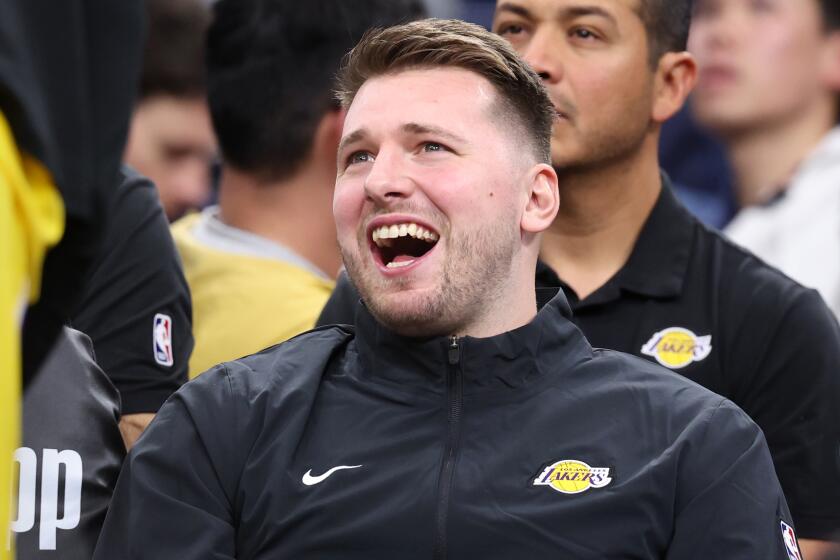Johnson Is Doing an Amazing Job With Mets
- Share via
NEW YORK — A square patch of blistery red skin covers the right side of Dave Johnson’s neck, matted into his complexion like a piece of wrinkled leather.
The scar, about 15 years old now, is a memento from his playing days with the Baltimore Orioles. As a spunky second baseman, he was spiked after breaking up a double play.
But Johnson, never one to be self-conscious, wears the wound like a badge of honor--a reminder that “this is how I played the game of baseball.”
At 42, seven years removed as a player and now managing the New York Mets, Johnson still assumes the hardened, down-in-the-trenches role of a middle infielder. His credo: Be aware of everything, work hard and always look for that winning edge.
This curious blend of strategist, social worker and slangy jock has worked his magic on a losing club the past two years and turned it into a contender in the National League East. Last season, the Mets finished second in the division with a 90-72 record, quite a turnaround from the 68-94 last-place finish of 1983.
As a new-wave computer manager, he prefers printouts to index cards and graph paper to legal pads. But he still plays hunches, and he stands by every move he makes.
In post-game interviews, Johnson has been known to snap at second guessers and say he doesn’t make field-managing mistakes because “I do everything for a good reason.”
One example is his prudent use of Dwight Gooden. Some have suggested the Mets maximize their pitching prize by using him more often; Johnson won’t hear of it.
“He’s too young to put him on a four-day rotation,” he said of Gooden, who usually pitches with four days rest. “Not that he couldn’t handle it. But at his age, he doesn’t have the muscle structure for it yet.”
Though a product of old-school, Oriole fundamentals, Johnson is well-versed on baseball’s modern theories.
Among the books neatly lined on a shelf in his office are “The Hidden Game of Baseball” and “Percentage Baseball,” which may account for his chatter about sine curves, parabolas, trends, probabilities, and favorable chances.
It is a bent that used to infuriate his Orioles manager, Earl Weaver, and caused his Baltimore teammates to playfully nickname him “Dum Dum.”
“He had ideas that nobody understood, and worded in a language of an MIT professor. It’s only now we realize that Davey was ahead of his time,” said Orioles’ scout Jim Russo, who signed Johnson to his first professional contract.
“Davey just thought he knew everything about everything,” said Jim Palmer, the Cy Young Award winner now retired from the Orioles.
One day, during the late 1960’s, Johnson handed Weaver a sheet entitled “Optimization of the Orioles’ Lineup.” He told Weaver he could get more run production with a different lineup, and offered him one. It had Johnson, who consistently batted near the bottom of the order, hitting cleanup on a team that included sluggers Frank and Brooks Robinson, and Boog Powell. Weaver, grinning in disbelief, ripped up the lineup and threw it away.
Johnson said he has three simple rules for managing: Never make a player do what he can’t do, never embarrass him, and show confidence in him.
“I feel there’s more to be learned by finding out what’s going on in a player’s mind than by calling him a ‘bonehead’ or an ‘idiot,’ ” he said.
“He takes the pressure off and allows you the freedom to produce,” said Met second baseman Wally Backman. “It’s a respect that he gives us that we end up giving back to him. What he has now is a family of 25 individuals pulling for one another and uniting for a single purpose.”
Johnson has a two-year deal with the Mets that runs through 1986 and is worth an estimated $125,000 annually. Next year, he says, is it.
“I’ll walk away. I don’t intend on being in the managers’ pool. I simply want to build this club to the point where, if I’m not here anymore, anybody can come in here and win a championship,” said Johnson, who guided the Mets’ Tidewater Tides to the Governor’s Cup Championship and the Triple-A World Series title in 1983.
It’s also likely he will want a break from the aggravation of managing a major league club.
Johnson often wanders to the corners of the dugout during games to chew handfuls of antacid tablets like peanuts. Last season, assorted brands were as visible on his office desk as his computer.
“He may not show very much on the outside, but he boils within,” said Frank Howard, a Mets’ coach in 1984 and now with the Milwaukee Brewers. “His stomach and mind are always churning.”
More to Read
Go beyond the scoreboard
Get the latest on L.A.'s teams in the daily Sports Report newsletter.
You may occasionally receive promotional content from the Los Angeles Times.










